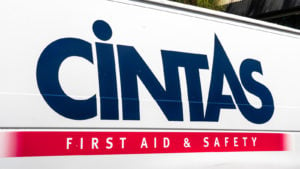
The S&P 500 is currently at roughly 5,500. Big tech companies under the Magnificent Seven moniker have been carrying the stock market for several years, and AI tailwinds suggest that the gains can continue.
The index is up by roughly 800 points year-to-date, which means it can take a few years before it reaches 7,000. Many top corporations have been expanding their revenue and earnings for several years. Slow and steady wins the race in investing, but some stocks continue to outperform the S&P 500. Discovering these stocks and accumulating their positions can result in sizable returns when the S&P 500 exceeds 7,000.
You don’t even have to look at individual stocks. The Nasdaq has outperformed the S&P 500 for most years, but there’s a reason. The Nasdaq is more heavily concentrated in tech stocks than the S&P 500. While tech isn’t the only sector delivering high returns, it’s worth exploring that sector for most of these seven picks.
Amazon (AMZN)

Amazon (NASDAQ:AMZN) is a top component of the S&P 500, delivering a 33% year-to-date gain for investors. Shares are also up by 106% over the past five years. Amazon has plenty of Wall Street enthusiasts on board. The corporation has received an average price target with a 12% upside. Amazon is rated as a Strong Buy, and the highest price target of $246 suggests that shares can gain an additional 23%.
The tech giant delivered solid first quarter results, featuring 13% year-over-year net sales growth. Net sales in North America and international markets maintained double-digit growth rates. Amazon Web Services revenue growth reaccelerated to 17% year-over-year. This part of Amazon’s business should continue to benefit from the rising demand for artificial intelligence.
Amazon also benefits from groceries, advertising, streaming,and other business segments. Advertising has been a top performer for several quarters and generated $11.8 billion, a 24% year-over-year improvement.
Cintas (CTAS)

Cintas (NASDAQ:CTAS) is a dividend growth stock that has delivered impressive returns and cash flow for several years. The stock has roughly tripled over the past five years and offers a 0.76% yield for investors. Cintas hiked its dividend by 17.4% last year and will announce a new dividend hike in a few months.
The business safety equipment provider has more than one million businesses as its customers. That level of diversification helped Cintas generate $2.41 billion in Q3 FY24 revenue. That’s a 9.9% year-over-year improvement. Net income surged faster, climbing up by 22.0% year-over-year. Cintas ended up recording $397.6 million in net income that quarter.
Four Wall Street analysts rate Cintas as a moderate buy. The highest price target of $765 per share suggests that the stock can rally by an additional 8% from current levels. Heightened fiscal 2024 guidance suggests that Cintas can continue to deliver steady gains for investors and potentially reach the high end of analysts’ price targets.
Meta Platforms (META)

Meta Platforms (NASDAQ:META) has delivered exceptional returns for long-term investors stuck around throughout a challenging 2022. Shares have rebounded from their lows and are up by 55% year-to-date. The company’s stock has also almost tripled over the past five years.
Meta Platforms more than doubled its net income in the first quarter as daily active users exceeded three billion across its social networks. The company achieved record-breaking profits by delivering 27% year-over-year revenue growth and trimming its headcount. These results and the dividend program that started in Q4 2023 attracted a heap of praise. Meta Platforms can become a dividend growth stock with an annual double-digit growth rate for many years.
Wall Street is quite bullish on this Magnificent Seven stock. It is rated as a Strong Buy among 42 analysts, and the highest price target of $600 per share suggests a potential 12% gain from current levels.
Deckers Outdoor (DECK)

Deckers Outdoor (NYSE:DECK) is a growing athletic apparel company scooping up market share from rivals. The company’s HOKA and UGG shoes are flying off the shelves to the delight of shareholders. Deckers Outdoor stock is up by 39% year-to-date and has more than quintupled over the past five years. Despite those gains, the stock is currently in a correction. It’s down by more than 14% from its all-time high.
The correction presents a buying opportunity for long-term investors. The stock trades at a 32 P/E ratio and delivered solid results in the fourth quarter of fiscal 2024. During that quarter, revenue increased by 21.2% year over year. Domestic sales increased by 19.4% year over year, while international sales jumped by 25.2% year over year. Diluted earnings per share came in at $4.95, compared to $3.46 per share in the same quarter last year.
13 Wall Street analysts rate Deckers Outdoor as a moderate buy. The average price target implies a 13% upside from current levels, and the highest price target of $1,265 per share suggests that shares can gain an additional 35%.
Texas Roadhouse (TXRH)

Texas Roadhouse (NASDAQ:TXRH) is an under-the-radar restaurant stock that continues to outperform the stock market. Shares are up 43% year-to-date and have gained 213% over the past five years. These returns also come with a 1.43% yield, and Texas Roadhouse has maintained a double-digit dividend growth rate for several years.
First quarter results indicate that Texas Roadhouse is growing while retaining many of its customers. The steakhouse chain reported 12.5% year-over-year revenue growth in the first quarter, while net income increased by 31.0% year-over-year. Those growth rates resulted in an 8.6% net profit margin.
8.4% comparable sales growth indicates that people are returning to their local Texas Roadhouse often. This retention should help the company deliver better results in future quarters as it continues to expand. Texas Roadhouse opens some of its own restaurants and lets franchises open up other locations. Between its company-owned and franchise-owned restaurants, Texas Roadhouse has 753 restaurants.
Upwork (UPWK)

Upwork (NASDAQ:UPWK) looks ready to deliver gains for patient investors. After soaring during the pandemic and crashing as the world went back to normal, Upwork has been reporting financial wins and has a decent 32 P/E ratio. Shares are up by 22% over the past year but remain well removed from their all-time high.
The online freelance marketplace reported 19% year-over-year revenue growth in the first quarter. Net income came to $18.4 million in the quarter, a 7% year-over-year improvement. Advertising represents the company’s fastest-growing segment, with 93% more revenue than last year. Freelancer Plus is also growing quickly and has improved its revenue by 76%. Over 100,000 people now use Freelancer Plus.
Upwork’s Q2 guidance suggests that revenue will grow at roughly 14.2% year over year. It also raised its full-year revenue guidance from the $760 million to $780 million range to the $770 million to $782 million range.
Duolingo (DUOL)

Duolingo (NASDAQ:DUOL) is an educational app that helps people learn new languages through verbal and written exercises. The stock has been a roller coaster for long-term investors, but things are starting to tick upward. Shares have increased by 35% over the past year, and financial results suggest that more gains may be coming.
Revenue increased by 45% year-over-year, while net income again turned positive in the first quarter. Net losses seem to be a thing of the past, as the company turned a $2.6 million Q1 2023 net loss into a $27.0 million profit this quarter. Duolingo’s daily and monthly active users grew at impressive rates, 54% and 35% year-over-year, respectively. The company now has roughly 100 million monthly active users and more than 30 million daily active users.
Duolingo is rated as a Moderate Buy and has an average price target of $275 per share, which suggests a 33% upside. The highest price target of $275 per share suggests that Duolingo can gain an additional 43% from current levels.
On this date of publication, Marc Guberti held long positions in AMZN, DECK and TXRH. The opinions expressed in this article are those of the writer, subject to the InvestorPlace.com Publishing Guidelines.
On the date of publication, the responsible editor did not have (either directly or indirectly) any positions in the securities mentioned in this article.




